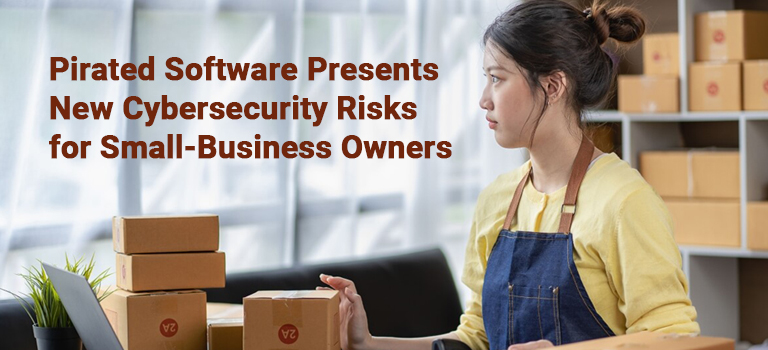Although using unlicensed or pirated business software is illegal, many companies still get away with it. According to the latest Global Software Survey conducted by the Business Software Alliance (BSA), approximately 37% of all software worldwide is unlicensed and technically illegal.
The continued practice of software piracy might not always result in legal repercussions, but it can lead to many cybersecurity problems. Global cyber-attacks increased by 38% from 2021 to 2022 as businesses moved to remote work environments and relied more on digital tools.
Additionally, many small businesses don’t think cybersecurity is a high priority, which leaves them even more exposed to pirated software risks. Pirated software will only become more common as they switch to a remote model. Here are some of the biggest risks companies face when they use pirated software and how to avoid them.
1. Unexpected Add-Ons
Pirated software often comes with unexpected add-ons that can lead to irreparable damage. Sometimes they are benign items such as cache or tracking cookies, but they’re usually a form of malware that can turn a computer into a highly infectious place. Spyware is a common type of malware that sends pop-up ads, redirects users to certain websites and monitors browsing activity.
In many cases, the software contains a harmful Trojan. Trojans are special types of malware found in about half of all pirated software downloaded onto computers. Cybercriminals often bundle Trojans with pirated software because it decreases the chances of detection. They can steal private information, encrypt files without a business’s consent and create new entryways for cybercriminals to access infected computers.
2. Frequent Crashes
Even if the pirated software has no harmful malware, it can still be prone to frequent crashes and poor overall performance. This problem is common for two reasons. First, many illegal software developers do a poor job trying to recreate the original product. It’s usually full of bugs and glitches that make it unusable in the long run.
The second reason pirated software crashes so often is the presence of Digital Rights Management (DRM) software. Legal software developers use this copyright security measure to prevent illegal duplicates. If someone tries to use a pirated version, the hidden DRM software causes it to crash.
3. Total Device Takeover
“Backdoor threats” are often built into pirated software, which allows cybercriminals to access the device and steal virtually everything. In the worst cases, the software contains ransomware that locks up the entire device until the cybercriminal receives a payment. Small businesses would suffer a major financial setback and might have to file for bankruptcy after paying the demanded amount.
Cybercriminals also often gain full control of people’s computers with the sole intent of infecting other devices. This strategy is common when they target government agencies or big corporations. When the culprit is identified, companies see the victim’s identity and the real criminals can remain anonymous.
4. No Updates
Businesses that use pirated software are unauthorized parties, meaning they don’t have access to updates. The inability to update puts businesses at a huge disadvantage. They can’t fix the bugs and crashes or improve functionality. The software quickly becomes outdated even if it doesn’t contain any malware.
Having no updates can be especially disastrous for electric vehicles because their updates often contain important patches for autonomous controls and cybersecurity. Companies with electric fleets would suddenly come to a screeching halt if infected with malicious pirated software. Accidents might even occur and result in loss of life.
5. No Access to Customer Support
If and when pirated software starts causing problems, companies can’t go to customer support for help. They must deal with the situation themselves or risk legal repercussions for using the software. If they choose the first option, they could fall victim to data loss, identity theft and bankruptcy.
The consequences can be steep if they choose the second option and decide to come clean. Using or distributing pirated software is a felony resulting in up to $150,000 in fines for everyone involved. The maximum prison sentence is five years. Small-business owners can’t afford either punishment — the risk is just too great.
6. Dangerous Pirating Websites
Even considering using pirated software can pose severe cybersecurity risks. Websites containing files of unlicensed software are often riddled with malicious ads, links, and files. With one accidental click, users could download malware straight onto their computers without even touching the pirated software.
All businesses should follow two general principles when navigating unfamiliar websites. If the website’s URL contains “https” and has a padded lock icon next to it, it’s probably safe to browse. Any other site has an insecure connection and could contain malware, so it’s vital to avoid using them. All software downloads should come from trusted, secure places.
It’s Time to Start Taking Cybersecurity Seriously
It’s extremely concerning that so many small businesses don’t consider cybersecurity a high priority in 2023. The common usage of pirated software is another cause for concern.
Cyber threats will only become more prevalent as the world becomes increasingly entrenched in the digital age. It’s time for businesses to take cybersecurity seriously and ditch pirated software to stay safe and operate without worries.
Oscar Collins
Tags: Business Security, Piracy, Software


